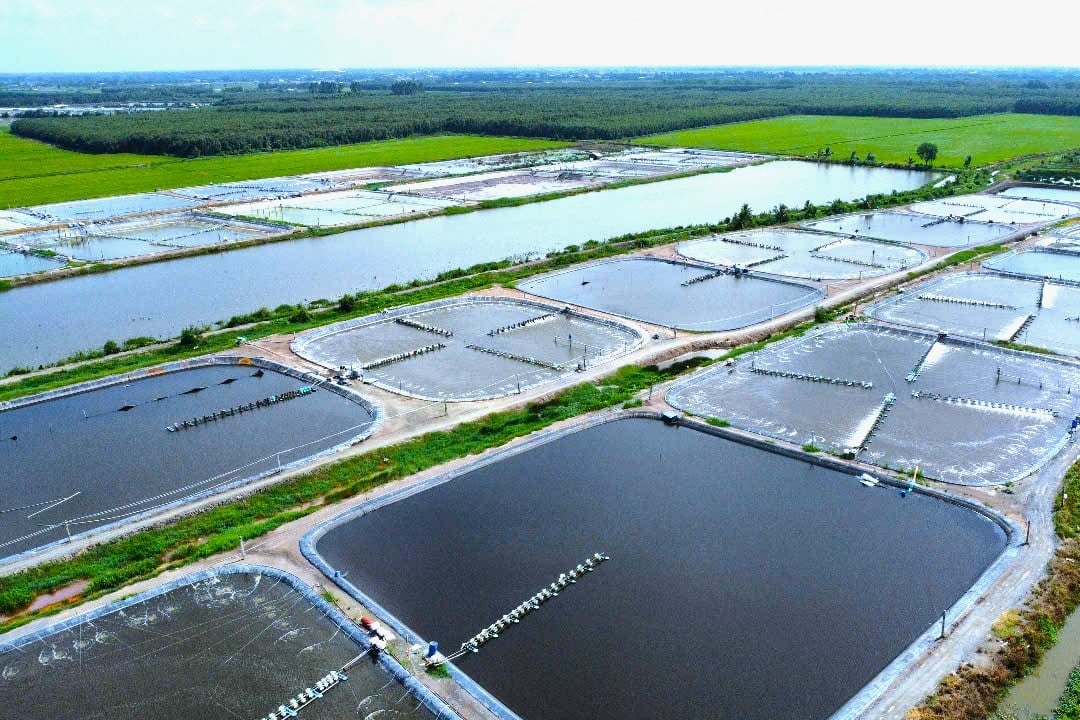November 26, 2025 | 12:23 GMT +7
November 26, 2025 | 12:23 GMT +7
Hotline: 0913.378.918
November 26, 2025 | 12:23 GMT +7
Hotline: 0913.378.918
The application of digital technology in aquaculture is becoming an inevitable trend toward sustainable production. Digital solutions help farms and households save time and costs while improving labor productivity, product quality, and minimizing negative impacts on the environment.
In several countries around the world, many models of digital technology applied in aquaculture have emerged and proven highly effective. For instance, aquaculture robots can clean ponds, inspect cage nets, remove dead fish, administer vaccines automatically, and monitor fish health and behavior. Similarly, drones are used to supervise farms, check water quality, detect dead fish, collect data, and analyze it using artificial intelligence (AI).

The application of digital technology in aquaculture is an essential solution to minimize negative impacts on the environment. Photo: Kim Anh.
In Vietnam, particularly in the Mekong Delta region, recent years have seen rapid development of models applying digital technology in environmental monitoring and aquaculture health assessment. Among these, brackish-water shrimp farming has widely adopted automatic monitoring technology in intensive and super-intensive farming models. These systems evaluate pond water quality, allowing farmers to easily track data via mobile phones and quickly implement appropriate water management solutions.
For example, the School of Aquaculture at Can Tho University has developed the RAS (Recirculating Aquaculture System), a model that integrates shrimp and fish farming to optimize nutrient use and manage waste. This model has been introduced and transferred through training to many households and enterprises in the Mekong Delta.
The application of digital technology in aquaculture is not only a solution to increase productivity and efficiency but also an inevitable trend to reduce negative environmental impacts. By using smart monitoring systems, farmers can track water quality indicators such as pH, oxygen, and salinity in real time, thereby adjusting feed and water treatment in a timely manner.
Meanwhile, the School of Engineering (Can Tho University) has advanced technology for continuous water quality data collection using environmental monitoring sensors in ponds, replacing manual sampling methods.
According to Associate Professor Dr. Huynh Truong Giang, Vice Rector of the School of Aquaculture at Can Tho University, opportunities to apply digital technology in aquaculture in the Mekong Delta are currently auspicious.
One key driver is the strong support from the Politburo’s Resolution No. 57-NQ/TW, which emphasizes breakthroughs in science, technology, innovation, and national digital transformation. Numerous supportive policies from ministries, sectors, and local authorities also contribute to this.
In addition, the growth of domestic technology enterprises, coupled with international cooperation, promises many new solutions for farmers.
However, the development of digital technology in aquaculture still faces many challenges. The first is the high cost of technology investment, which makes it difficult for small-scale households to access. The connection between farmers and digital technology enterprises is not yet strong. Moreover, farmers and farms still have limited capacity to master and operate technology. Many solutions remain at the pilot stage, with a considerable gap between research and commercialization. In some farming areas, data infrastructure and internet connectivity remain unstable.
Therefore, for digital technology to truly spread across aquaculture in the Mekong Delta, Dr. Huynh Truong Giang emphasized the need for comprehensive solutions. These include credit and policy support to help farmers, cooperatives, and enterprises invest in technology; training and digital skills development for farmers to actively operate and utilize data; strengthening the connection between technology supply and demand by fostering collaboration among researchers, tech companies, and farmers; and standardizing and certifying products with traceability to meet export requirements.
Translated by Kieu Chi

(VAN) The model of making a living under the forest canopy through the agroforestry system in Van Son commune, Bac Ninh province, is expected to generate an annual income of approximately VND 30 million/ha.

(VAN) Many enterprises in Can Tho are harnessing natural energy and reducing greenhouse gas emissions in their production processes, thereby contributing to the promotion of a sustainable green transition.
/2025/11/24/3536-2-112800_176.jpg)
(VAN) Dong Nai now has tens of thousands of hectares of forests certified for sustainable management, and this area will continue to be expanded in the coming period.

(VAN) Vinh Ha hamlet (Dai Xuyen commune, Hanoi) is shifting away from small-scale farming as households adopt bioscurity into their breeder chicken models.

(VAN) Heavy rains make aquatic species more vulnerable to disease. Proactive water management and high-tech systems help farmers prevent outbreaks and protect yields.

(VAN) Greenhouses are shifting production mindsets in Binh Lu commune, enabling farmers to ‘weather the sun and rain’ and secure stable vegetable harvests throughout the year.

(VAN) Green transition is crucial for the Mekong Delta amid climate change and stricter standards, offering a path toward sustainability.